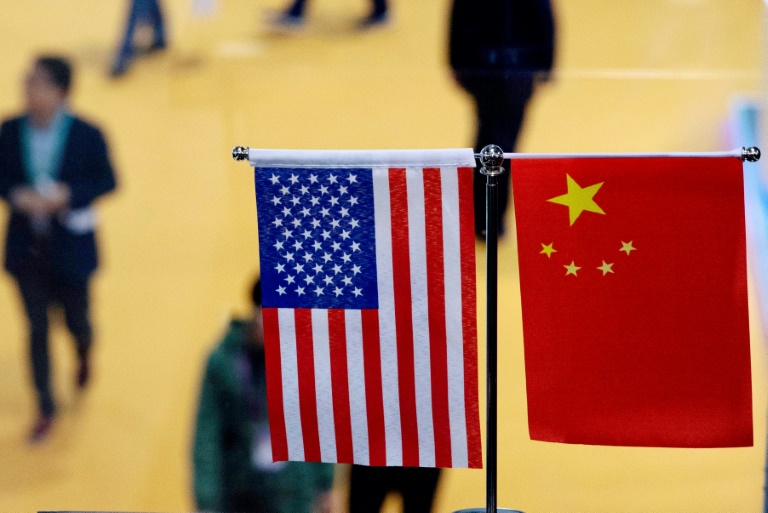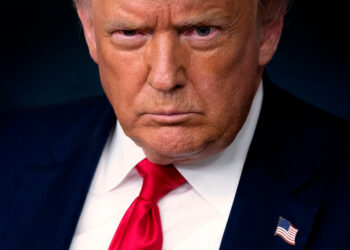Earlier this month, President Donald Trump addressed the nation on the steps his administration will take to combat the coronavirus pandemic. Instead of offering detailed policies and trying to unite Americans against a collective threat, he used this rare public moment as another opportunity to blame China.
Trump’s constant criticism of China derives partly from his narrow political mantra of putting “America First” but mainly from an existential fear of China.
China has witnessed unprecedented growth over the last decades and is on its way to becoming the world’s largest economy. Moving away from the collectivized agricultural system towards a market economy under Deng Xiaoping played a key role in China’s transformation.
Let’s be clear here: China did not do it all on its own. It was the United States that encouraged China to join the rules-based international order, out of the genuine belief that China would liberalize its economy and open up to the world and its values. Washington feels that this belief has been shattered.
China Under Xi
China under President Xi Jinping has become more repressive, illiberal and has clawed back to some of the Maoist traditions. The hard-fought political reforms have been to a certain degree reversed.
However, in contrast to Russia, China has not attacked democracy and strongly supports the international system. It has become one of the largest funders of the United Nations, deploying the largest number of peacekeepers in the world, and sought for years to participate more heavily in international organizations.

Economically speaking, China remains a puzzle. President Xi has successfully extended party control. At the same time, he continues to promote free-market, bureaucratic, and judicial reforms. While Beijing does not shun away to flex its military muscles, it hardly ever uses them – unlike the United States – to topple regimes around the world.
China is not a hegemony that seeks the destruction of democracy and the liberal international order. And the United States knows it.
US’ Inconsistent China Policy
However, the Trump administration’s strategy towards China is mixed at best and incoherent at worst.
On the one hand, the Trump administration is willing to push for further interconnection on trade, giving China more leverage over the American economy. When it comes to technology, on the other hand, the administration is looking for rupture. The United States demands from the world to pick sides on Huawei, and yet few are willing to do so. China is the largest trading partner for many countries, including the United States, and complete detachment is in nobody’s interest.
The U.S. policy is so inconsistent because the status quo is about to change. China represented 1 percent of global GDP in the Deng Xiaoping era. Nowadays, China represents almost 16 percent. Washington is losing its uncontested leadership position in the world. And China legitimately demands more influence on both the regional and global levels. The clash will not simply go away by resolving trade and technology disputes. The United States must cease to isolate China because it is afraid that China will surpass it.
China, which is a great economic power, is considered a Developing Nation within the World Trade Organization. They therefore get tremendous perks and advantages, especially over the U.S. Does anybody think this is fair. We were badly represented. The WTO is unfair to U.S.
— Donald J. Trump (@realDonaldTrump) April 6, 2018
It shouldn’t be: China’s GDP per capita is low, it faces demographic decline, and the demands for political candor have just begun. Competition between both countries is natural. But it should happen within the international framework and not outside of it. This means that the United States has to give China more say on the global scale and focus on deterring China where it really matters.
International World Order
The Communist Party’s utmost disrespect for human rights in Xinjiang, its aggressive position in the South China Sea, and the use of cyber warfare need to be addressed. However, China’s increasing position in the world and willingness to act consistent with its responsibilities – depicted once again by China’s decision to send medical supplies to Italy for battling the coronavirus – have to be taken into account by the United States.
“Keeping these two giant and powerful nations together in harmony is so important for the world — not only for us, for the whole world,” President Trump said in January. In this case, the administration should stop lashing out against the international world order. China has changed and will change again for the better, but only if the United States continues to engage with China in the international framework.
The current approach is misguided and will cost the United States both its credibility and ability to shape the Chinese order. Only through engagement can the United States keep China from building its own supply network and technology infrastructure.
A cold war 2.0 with China is not a war that America can win.
Disclaimer: The views and opinions expressed here are those of the author and do not necessarily reflect the editorial position of The Globe Post.























